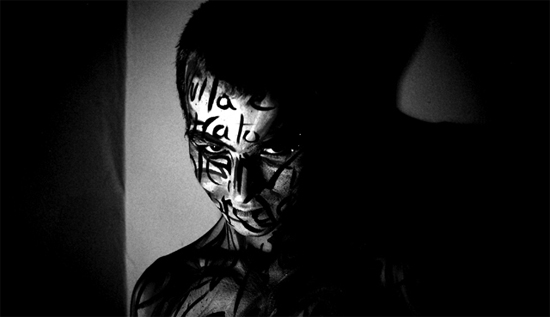Sometime around April this year, a promo of Seb Gainsborough’s debut EP as Vessel dropped through my (digital) letterbox – and, as is often the case, could easily have been swept away in the digital deluge that is the modern email inbox. A couple of things, though, caught the attention instantly: Gainsborough was from Bristol, and the Nylon Sunset EP boasted a remix of the title track by one of the UK’s finest producers, Punch Drunk Records boss Peverelist – quite a coup for a first release. It turned out to be one of the best debuts I’d heard in a while, veering from Hessle Audio-ish percussive workout ‘Ton’ to the beautiful, woozy slow house of ‘Blushes’, via all sorts of other signifiers: the muddy US lo-fi of James Ferraro; the arty, uniquely British experiments of the BBC Radiophonic Workshop; Modern Love’s wide-ranging takes on techno. Nylon Sunset was definitely club music, but unlimited by notions of what club music ought to sound like, its horizons broader and less strictly defined. That angle was further cemented by his next two releases: a split cassette of fuzzy melodic house with fellow Bristolian El Kid, and a pair of collaborative tracks with Zhou, which slowed the tempo to a weary trudge.
On a wider level, there’s definitely something in the water in Bristol. As one of the key centres of global electronic music, despite (or perhaps because of) its small size it’s always been able to support a surprisingly large and innovative musical community, all the way from the earliest days of Massive Attack, Tricky et al through to its adopting and personalising of dubstep around the middle of last decade. Certain common themes have been consistent throughout – dub’s resonant spaces and soundsystem bass weight; punk’s straight-to-the-point, DIY attitude; an unashamed love of a good party – but Bristol’s is a musical landscape constantly in flux, always eluding limiting notions of genre in favour of open-mindedness, experimentation and collaboration.
At the moment, the city is in another state of transition: over the last twelve months, what started as a growing interest in house music among the city’s bass devotees has budded off into its own entity. Right now its energy is infectious – it feel as though you can’t go more than a week or two without another salvo of excellent new music, both from older hands like October (whose new TANSTAAFL label has established a conduit into Berlin), Punch Drunk boss Peverelist and Immerse label head Kidkut, and from a new generation of producers like Kowton, Hodge, El Kid and Kahn.
Gainsborough counts among that number – he’s part of the Young Echo crew alongside Zhou, Kahn and El Kid, and has an upcoming 12” for Immerse showcasing a dancefloor edge to his productions. But his interests stretch further than producing tracks for club floors. He’s recorded a blurry, downbeat mix for the Quietus that seamlessly melds music from himself and contemporaries Hackman, Amos Childs and El Kid with material from the likes of Ferraro, Delia Darbyshire and John Cage.
On the phone, we begin by speaking about the sort of knackered, drum machine heavy tracks currently being produced by the likes of Andy Stott and Kassem Mosse. “It’s really interesting, cycles of technology, [changes in] peoples’ ears and what they like to listen to,” Gainsborough says. “They spend all this time on the digital revolution and making things perfect, getting everything louder and louder, and then go ‘No, it’s too loud, it’s too bright, it’s too nice, we need some shit in it again’. [That said], everyone thinks digital music sounds perfect, but that’s because people don’t spend enough time on it. It’s really easy to load up a plugin and make things sound really shiny.”
Well, a lot of your stuff sounds fairly…
Seb Gainsborough: Fucked! [laughs] I don’t know, it mostly depends on what I’m making, but I really like things, especially electronic music, that sound really greyscale and murky.
So what kind of stuff are you making at the minute? Your Nylon Sunset EP was fairly house-leaning, though I notice you’ve been careful not to associate yourself too closely with one genre.
SG: Yeah. I feel like such an arsehole when I say that kind of stuff. It’s not me being antagonistic or saying I’m against this or that genre, it’s just that I get really interested in what you can do at different tempos. All these different speeds allow you to create different grooves, different rhythms, different emphasis on structure and things like that. I find that fascinating and just really fun. What I’ve been doing with Amos from Zhou, Jabu and Young Echo recently is stuff like starting a beat at 200bpm and taking out loads of kick drums, so obviously it’ll be half the tempo basically, and you end up with rhythms you just wouldn’t think of at that tempo. You completely change the vibe.
You’re collaborating with people a fair bit as well, right?
SG: I’ve been working with Amos for about eighteen months now, we’ve been doing a lot together, and we’re taking a lot of influence from juke at the moment. The energy you get at that stage is really fun to play with. What’s really fascinating about it is that you can do things at [juke] speed with a juke vibe, but when it comes to the UK we tend to want to soften the edges somewhat. And you can almost put an ambient vibe on it, it’s really interesting, and it completely changes it. It’s like Andy Stott’s juke tracks as well, they were great. I also find there’s something quite humorous about it – it’s like gabba or hardcore, I really love those genres because they’re funny. Quite a lot of electronic music is really serious in one way or another, and genres like grime and juke are really good ways of saying ‘hold on guys…’
The Bristol scene seems incredibly strong at the moment – there’s a lot of cross-pollination, a lot of collaboration going on. What do you make of the way things are developing?
SG: It’s weird, I don’t go out clubbing anymore. But I’m obviously really connected in other ways to it, and it feels really amazing, there’s this huge vibe going on between everyone, everyone’s in contact and collaborating. And the music coming out of Bristol at the moment is really, really fucking good, cutting edge stuff. It feels really exciting to be a part of that. The last time I can think that this happened – and I wasn’t really aware of it at the time – was the whole Appleblim, Shackleton and Peverelist thing [in 2007-2008], pushing dubstep forward. That was really exciting for Bristol, but nothing really amazing’s happened in between. And what I like about [what’s happening now] is that – I guess it’s like anything at the time – you can’t quite put your finger on what it is yet. It’s more of a general energy. There is a shift towards house stuff, but we’re not sticking to those rules.
And you’re working with a crew, Young Echo.
SG: That came about because I’d been making music with Amos for a while, and with Chris – the other guy from Zhou – we all decided that we wanted to do a radio show. It was mainly because we were looking exactly at that movement that Appleblim, Peverelist and Shackleton were involved in, and thinking ‘Look how much collaborative clout they have when they operate together as a unit’. It feels like there’s a big thing going on – like Detroit, where they had various aliases to make the scene seem bigger than it was. It’s just a nice thing to do with your mates, and it draws you together, it gives you more power in the community – not in a megalomaniac kind of way, but you can support each other and people look at you as a group. It’s a really healthy thing to do as well, especially when you’re on your own all the time, if you can get together with a group of people doing a similar thing.
So tell me about the mix – what were your ideas behind it?
SG: My cynicism’s been increasing over the last few months and I didn’t want to just do a club mix – because I’m quite bad at them, my selection’s quite weak, I’m not enough into the club stuff to get all the fresh tunes – so I just wanted to do something I felt was more ‘me’, and more varied. A mix that varied in tempo but was united by atmosphere, or by more general vibe. And I managed to get a Sylvia Plath poem in there, so my cool credentials are on show [laughs].
Vessel – Quietus Mix
Vessel – Quietus Mix by theQuietusAmos Childs & Laurie Owens – ‘Void’ / James Ferraro – ‘Untitled’ / ‘November Graveyard’ (written and read by Sylvia Plath)
REI – ‘Fleisch’
REI – ‘Gabriel’s Descent’
Cretin – ‘Yulch’
Suum Cuique – ‘Red Binary’ / Sebastian Gainsborough – ‘Tree Mutter’ / John Cage – ‘Six Melodies, for Violin & Harp (1950) No.2 [Legastissimo]’
El Kid – ‘Kachinja’/ Samoyed – ‘Trumpet O’Doom’
Bernard Parmegiani – ‘Pour En Finir Avec Le Pouvoir d’Orphee [Kaleidoscope 2]’
Bruce Haack – ‘Party Machine’
Vessel – ‘Nylon Sunset’
Vessel – ‘Nylon Sunset [Chopped and Screwed]’ / Andy Stott – ‘North to South’
Hackman – ‘Satisfy’
Emptyset – ‘Departure’ / La Monte Young – ‘The Well Tuned Piano’ / Paul Zaba – ‘Blessed’
Jabu – ‘Eyes On You’
Jabu – ‘Move In Circles’
Vessel – ‘Jupiter Rise’
Delia Darbyshire – ‘Four Aspects’
Grouper – ‘Sick’
DJ Ghosthunter – ‘Experiment 3 (MLZ Remix)’
Vessel – ‘Order Of Noise’



